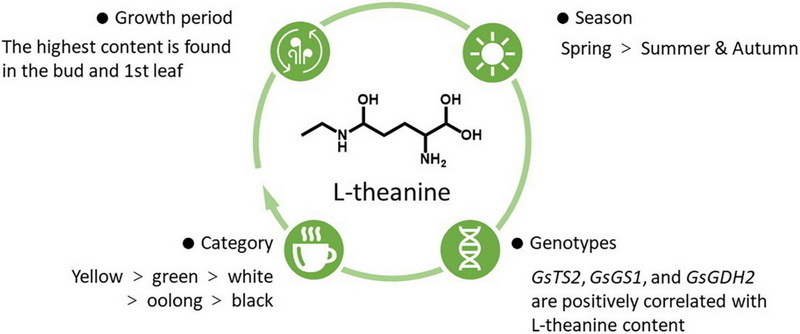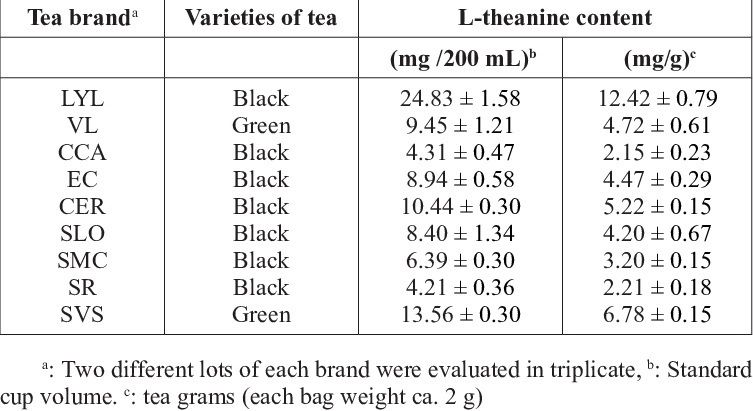Content Menu
● Understanding L-Theanine
>> Chemical Structure and Properties
● L-Theanine Content in Green Tea
>> Average L-Theanine Content
>> Factors Affecting L-Theanine Content
● L-Theanine in Green Tea Extract
>> Concentration in Supplements
>> Synergistic Effects with Caffeine
● Benefits of L-Theanine
>> Cognitive Enhancement
>> Stress and Anxiety Reduction
>> Sleep Quality Improvement
● How to Maximize L-Theanine Intake from Green Tea
>> Choose High-Quality Teas
>> Optimize Brewing Techniques
>> Consider Green Tea Extract Supplements
● Safety and Side Effects
>> Potential Side Effects
>> Interactions with Medications
● The Future of L-Theanine Research
>> Ongoing Studies
>> Potential Applications
● Conclusion
● FAQ
>> 1. How does L-theanine compare to caffeine in terms of effects?
>> 2. Can L-theanine help with weight loss?
>> 3. Is it safe to take L-theanine supplements daily?
>> 4. How long does it take for L-theanine to take effect?
>> 5. Can children consume L-theanine?
● Citations:
Green tea has long been celebrated for its numerous health benefits, and one of its key components, L-theanine, has gained significant attention in recent years. This unique amino acid is known for its calming effects and potential cognitive benefits. In this comprehensive article, we'll explore the L-theanine content in green tea extract, its effects on the body, and how to maximize its benefits.

Understanding L-Theanine
L-theanine is an amino acid found primarily in tea leaves, particularly in green tea. It's known for its ability to promote relaxation without causing drowsiness, making it a popular supplement for those seeking stress relief and improved focus.
Chemical Structure and Properties
L-theanine has the chemical formula C7H14N2O3 and is structurally similar to glutamate, a neurotransmitter in the brain. This similarity allows L-theanine to cross the blood-brain barrier and interact with brain chemistry, leading to its various effects.
L-Theanine Content in Green Tea
The amount of L-theanine in green tea can vary significantly depending on several factors, including the type of tea, growing conditions, and processing methods.
Average L-Theanine Content
On average, a standard 8-ounce (200 ml) cup of brewed green tea contains between 7.9 mg to 24.2 mg of L-theanine[1][2]. However, this can vary widely, with some studies reporting ranges from 5 mg to 85 mg per cup[4].
Factors Affecting L-Theanine Content
1. Tea Variety: Different varieties of green tea can have varying levels of L-theanine. For example, matcha green tea is known to have higher concentrations of L-theanine compared to regular green tea[2].
2. Growing Conditions: Factors such as soil quality, climate, and shade can affect the L-theanine content in tea leaves.
3. Processing Methods: The way tea leaves are processed can impact their L-theanine content. For instance, shade-grown teas like Gyokuro tend to have higher L-theanine levels.
4. Brewing Techniques: The temperature of the water and steeping time can influence the extraction of L-theanine from tea leaves.
L-Theanine in Green Tea Extract
Green tea extract is a concentrated form of green tea, often used in supplements and functional foods. The L-theanine content in green tea extract can be significantly higher than in brewed tea.
Concentration in Supplements
Green tea extract supplements typically contain a standardized amount of L-theanine. The concentration can range from 100 mg to 400 mg per serving, which is considerably higher than what you'd find in a cup of brewed green tea[3].
Synergistic Effects with Caffeine
One of the unique aspects of green tea extract is the synergistic relationship between L-theanine and caffeine. This combination is believed to provide a balanced stimulant effect, promoting alertness without the jitters often associated with caffeine alone.

Benefits of L-Theanine
L-theanine has been studied for its various potential health benefits, particularly in the areas of cognitive function and stress reduction.
Cognitive Enhancement
Research suggests that L-theanine may improve cognitive performance, particularly when combined with caffeine. It's been shown to enhance attention, memory, and reaction time[6].
Stress and Anxiety Reduction
L-theanine is known for its ability to promote relaxation without sedation. It may help reduce stress and anxiety by increasing alpha brain waves, which are associated with a state of wakeful relaxation[2].
Sleep Quality Improvement
While L-theanine doesn't cause drowsiness, it may help improve sleep quality by promoting relaxation and reducing anxiety that can interfere with sleep[3].
How to Maximize L-Theanine Intake from Green Tea
If you're looking to increase your L-theanine intake from green tea, consider the following tips:
Choose High-Quality Teas
Opt for high-quality green teas, particularly those that are shade-grown like Gyokuro or Matcha, which tend to have higher L-theanine content[4].
Optimize Brewing Techniques
Use water at the right temperature (around 160°F or 70°C) and steep for the appropriate time (1-3 minutes) to maximize L-theanine extraction without over-extracting bitter compounds.
Consider Green Tea Extract Supplements
For those seeking higher doses of L-theanine, green tea extract supplements can provide a concentrated source. Always consult with a healthcare professional before starting any new supplement regimen.
Safety and Side Effects
L-theanine is generally considered safe when consumed in typical amounts found in tea or supplements. However, as with any supplement, it's important to be aware of potential side effects and interactions.
Potential Side Effects
While rare, some people may experience headaches, dizziness, or gastrointestinal discomfort when taking L-theanine supplements in high doses[7].
Interactions with Medications
L-theanine may interact with certain medications, particularly those used to lower blood pressure. Always consult with a healthcare provider before taking L-theanine supplements, especially if you're on medication.
The Future of L-Theanine Research
As interest in L-theanine continues to grow, researchers are exploring its potential applications in various areas of health and wellness.
Ongoing Studies
Current research is investigating the role of L-theanine in:
- Improving sleep quality
- Managing symptoms of ADHD
- Enhancing immune function
- Supporting cardiovascular health
Potential Applications
The unique properties of L-theanine make it a promising candidate for developing new functional foods and beverages aimed at promoting relaxation and cognitive performance.
Conclusion
L-theanine is a fascinating compound found in green tea that offers a range of potential health benefits. While the amount of L-theanine in a cup of green tea can vary, green tea extract supplements provide a more concentrated and consistent source. Whether you prefer sipping on a cup of high-quality green tea or taking a supplement, incorporating L-theanine into your routine may help promote relaxation, improve focus, and support overall well-being.
As research continues to uncover the full potential of L-theanine, it's clear that this unique amino acid will remain a subject of interest for both scientists and health-conscious individuals alike. Always remember to consult with a healthcare professional before making significant changes to your diet or supplement regimen, especially if you have existing health conditions or are taking medications.

FAQ
1. How does L-theanine compare to caffeine in terms of effects?
L-theanine and caffeine have different effects on the body. While caffeine is a stimulant that can increase alertness and energy, L-theanine promotes relaxation without sedation. When combined, they can provide a balanced effect, enhancing focus and attention without the jitters often associated with caffeine alone[6].
2. Can L-theanine help with weight loss?
While L-theanine itself is not directly linked to weight loss, green tea extract, which contains L-theanine, has been associated with potential weight loss benefits. This is likely due to the combination of catechins and caffeine in green tea, rather than L-theanine specifically[8].
3. Is it safe to take L-theanine supplements daily?
For most people, taking L-theanine supplements daily is considered safe. However, it's always best to consult with a healthcare provider before starting any new supplement regimen, especially if you have existing health conditions or are taking medications[7].
4. How long does it take for L-theanine to take effect?
The effects of L-theanine can typically be felt within 30 minutes to 2 hours after consumption. The duration of its effects is estimated to be between 8 to 12 hours[6].
5. Can children consume L-theanine?
While L-theanine is generally considered safe, there is limited research on its effects in children. It's best to consult with a pediatrician before giving L-theanine supplements to children. However, moderate consumption of green tea is generally considered safe for most children[7].
Citations:
[1] https://vilgain.com/vilgain-l-theanin
[2] https://greentealobby.com/l-theanine-in-green-tea/
[3] https://vita-nuova.com/products/l-theanine-green-tea-extract-providing-300mg-l-theanine-per-serving-sleep-relaxation-support-promotes-mental-clarity
[4] https://matcha.com/blogs/news/the-green-teas-highest-in-l-theanine-the-mood-boosting-amino-acid-that-fights-brain-fog-cognitive-decline-with-age
[5] https://www.scielo.cl/scielo.php?script=sci_arttext&pid=S0717-97072013000400057
[6] https://www.amazing-green-tea.com/theanine.html
[7] https://pmc.ncbi.nlm.nih.gov/articles/PMC9261829/
[8] https://www.japanesegreenteain.com/blogs/green-tea-and-health/how-much-l-theanine-is-in-green-tea






























